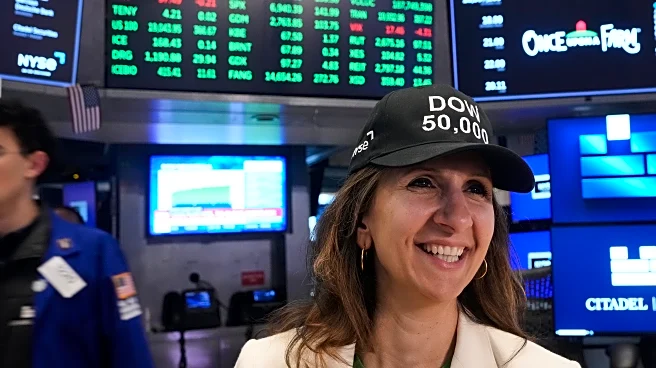What's Happening?
The Mega Millions lottery jackpot has surged to an estimated $965 million after no ticket matched all six numbers in the latest drawing. This marks the eighth time the jackpot has approached a billion
dollars since the game's inception in 2002. The next drawing is scheduled for November 14, with the cash option valued at $445.3 million. California's unique pari-mutuel rules mean that prizes in the state differ from standard values, affecting the distribution of winnings. The game has previously awarded seven jackpots exceeding $1 billion, with winners from various states including South Carolina, Michigan, Illinois, Maine, Florida, New Jersey, and California. The current record jackpot stands at $1.602 billion, won in Florida in August 2023.
Why It's Important?
The rising Mega Millions jackpot highlights the significant financial impact of lottery games on participants and state economies. With tickets sold in 45 states, Washington, D.C., and the U.S. Virgin Islands, the lottery generates substantial revenue, half of which supports state-designated causes and retailer commissions. The allure of a massive jackpot can drive increased ticket sales, benefiting state programs funded by lottery proceeds. Additionally, the jackpot's growth underscores the role of chance in creating life-changing opportunities for winners, while also emphasizing the odds of winning, which are 1 in 290,472,336 for the jackpot.
What's Next?
The upcoming drawing on November 14 will determine if a new winner emerges, potentially altering the financial landscape for the lucky individual. Should the jackpot remain unclaimed, it will continue to grow, further increasing public interest and ticket sales. States will continue to benefit from the proceeds, supporting various public initiatives. The outcome may also influence future lottery participation and strategies, as players consider the odds and potential rewards.
Beyond the Headlines
The Mega Millions jackpot's growth raises questions about the ethical implications of lottery systems, particularly regarding their impact on lower-income individuals who may disproportionately spend on tickets. The excitement surrounding large jackpots can overshadow the reality of low winning odds, prompting discussions on responsible gambling and the societal effects of lottery participation.










